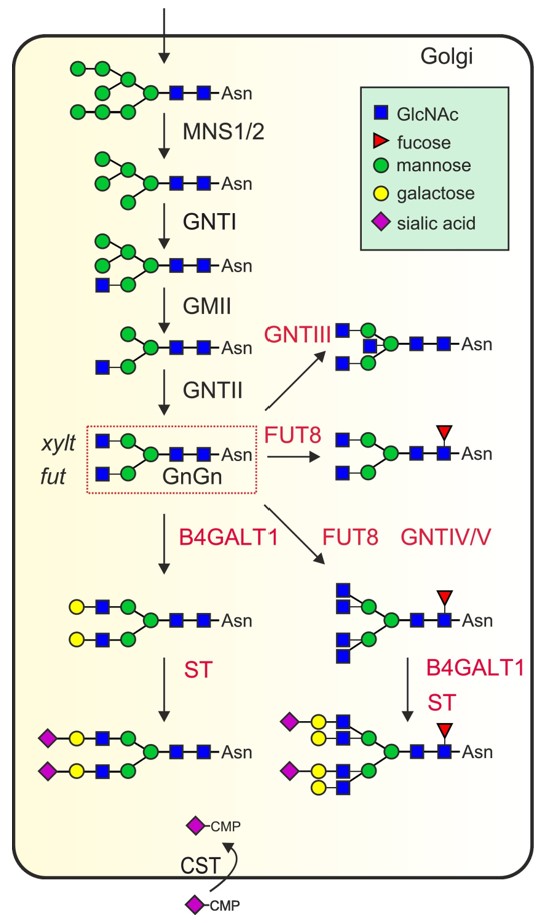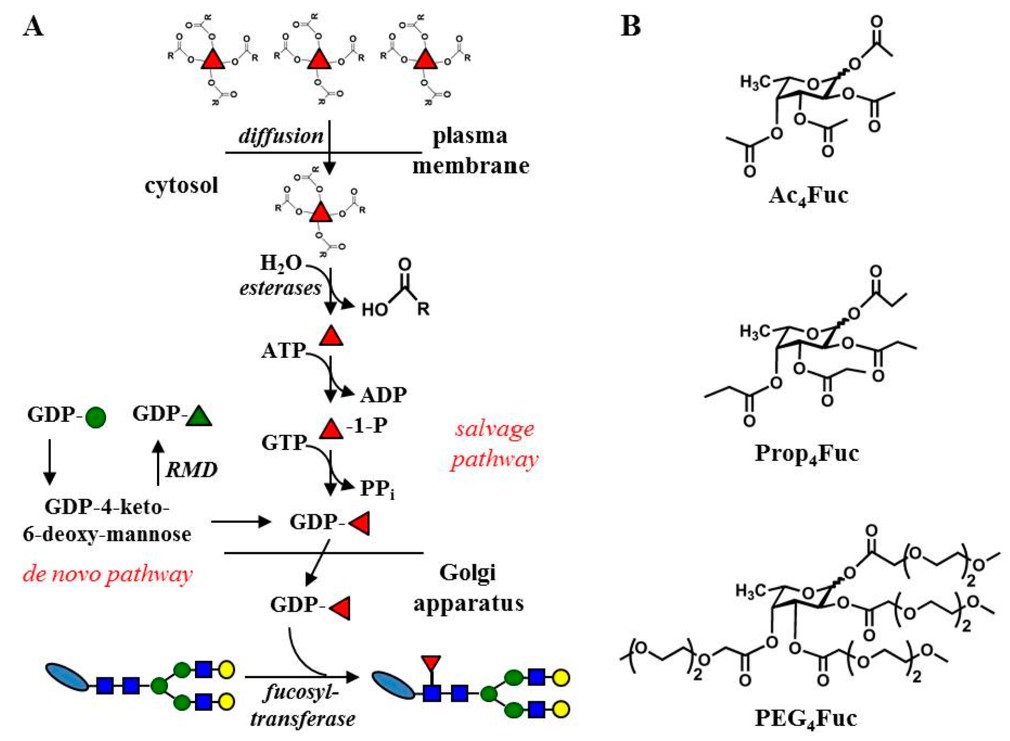Glycoengineering Services
Glycosylation is particularly important for protein function and is directly responsible for recombinant biopharmaceutical immunogenicity. Knowledge of glycosylation provides opportunities for designing glycans via genetic engineering in a wide variety of cell types and chemoenzymatic engineering. Equipped with world-leading technology platforms and professional scientific staff in glycoengineering of proteins and antibodies, Creative Biolabs is fully competent and dedicated to serving as your one-stop-shop for glycoengineering services.
The Importance of Glycosylation
 Fig.1 N-glycan engineering.1, 3
Fig.1 N-glycan engineering.1, 3
Glycosylation, which is the enzymatic coupling of glycans to proteins and lipids, is the most widespread posttranslational modification (PTM). About 50% of all human proteins are glycosylated. However, since glycosylation is not template-driven and combinatorial modification of the types and numbers of glycans is possible, each single glycoprotein is invariably present as a heterogeneous array of glycoforms, thus significantly increasing the diversity of the proteome. The glycoform profile of a glycoprotein plays important roles in the process of protein transportation, including directing the product to the cytoplasm, nucleus, cell surface, or marking it for secretion. Moreover, changes in glycosylation cause diverse diseases, and variations in the glycosylation profile of proteins have been identified as disease markers as well.
Biopharmaceuticals are increasingly dominating the biopharmaceutical industry pipelines. The larger and larger market size of glycoproteins makes glycosylation a critical factor in drug development that cannot be ignored by biopharmaceutical research. The demonstration of glycoform heterogeneity and differences in biologic activity associated with defined glycoforms has demanded control over the production process. Increased understanding of the functions of individual glycoforms has motivated glycoengineering to produce individual glycoforms and the generation of “bio-better” therapeutics.
Glycoengineering Service at Creative Biolabs
Glyco-engineered expression platform is an important strategy to improve biopharmaceuticals. A better control of the factors leading to glycan heterogeneity will simplify the process of production of recombinant glycoprotein with less variation in terms of glycosylation.
Creative Biolabs has developed a comprehensive glycoengineering platform. With many years of rich experience, we provide professional bio-better therapeutic protein glycoengineering services. Glucocerebrosidase is an important lysosomal enzyme, which is applied to treat Gaucher disease. Glucarpidase is a protease derived from E. coli and is used to treat acute poisoning by methotrexate or other similar drugs. We optimize the glycosyl structure of these enzyme proteins through glycoengineering technology to provide bio-better therapeutic proteins and enhance their therapeutic efficacy and biological activity.
Therapeutic antibody drugs have been used in a variety of clinical diseases, but the antibody carries heterogeneous glycans on its protein structure, which affects its stability, immunogenicity, and efficacy. Creative Biolabs has developed a systematic therapeutic antibody glycoengineering platform, and we use a variety of strategies to provide Custom Glycosyl Linker Synthesis and Glycan Remodeling services. Custom glycolinkers or glycoremodeled antibodies provide critical support for drug development and help optimize drug performance. In addition, we also provide custom glycoengineering for therapeutic antibodies according to client requirements.
With proven experience in glycoscience, Creative Biolabs has accumulated substantial experience and expertise in cell line glycoengineering. By assembling top-class scientific experts and integrating state-of-the-art technologies, Creative Biolabs has established several efficient glycoengineered expression platforms, including glycoengineered mammalian cell expression system, glycoengineered pichia pastoris expression system, and glycoengineered plant-based expression system. Our expression platforms can provide a completely new class of therapeutic glycoprotein with customized functions.
In addition to in vivo glycoengineering in different expression systems, we also provide high-level in vitro glycoengineering services to improve the quality control of therapeutic proteins and antibodies. Glycosylation affects the safety and efficacy of therapeutic proteins and antibodies, we generate high levels of sialylation and galactosylation through proven in vitro glycoengineering to selectively, rapidly, and efficiently produce different glycan variants of proteins. In addition, we provide large-scale active sugars and glycosyltransferases (see table below) to quickly and effectively achieve in vitro glycosylation changes.
Table 1 List of activated sugars and glycosyltransferase products.
|
Activated sugars
|
Glycosyltransferases
|
Related products
|
|
UDP-N-Acetylglucosamine
|
α-2,3-Sialyltransferase
|
N-Glycosidase F
|
|
UDP-N-Acetylgalactosamine
|
α-2,6-Sialyltransferase
|
Neuraminidase
|
|
UDP-Galactose
|
β-1,4 Galactosyltransferase
|
Alkaline Phosphatase
|
|
CMP-N-Acetylneuraminic acid
|
Recombinant α-2,3-Sialyltransferase
|
α-2,6-Sialyltransferase Residual Protein Kit
|
|
-
|
Recombinant α-2,6 Sialyltransferase
|
β-1,4-Galactosyltransferase Residual Protein Kit
|
|
-
|
Recombinant β-1,4 Galactosyltransferase
|
-
|
In vitro glycoengineering can save time to generate glycan variants, this technology is independent of the cell lines and biological processes used, so that it is no longer affected by different expression systems and fermentation conditions, and accelerates the glycosylation process of therapeutic proteins. For example, we galactosylate IgG using β-1,4-galactosyltransferase and obtain relative amounts of more than 90% of G2F glycans after 2 hours of incubation. We achieve sialylation of IgG in a short time using α-2,3- or α-2,6-sialyltransferase, generating a constant ratio of sialoglycans. In vitro glycoengineering of proteins improves the performance, stability, and efficacy of drugs, and increases the affinity of proteins with target receptors, which is an important drug development strategy.
Highlights
-
Highly efficient in vivo glycoengineered expression platforms
-
In vitro chemoenzymatic strategy
-
Top-class scientific experts and integrating state-of-the-art technologies
-
High flexibility and cost-effectiveness
We offer turn-key or ala carte services customized to our clients’ needs. Please contact us for more information and a detailed quote.
Published data
Modulation of cellular glycosylation pathways or specific glycan modifications of selected glycoproteins has great potential for exploring structure-activity relationships or enhancing glycoprotein activity and yield. This study describes a metabolic glycoengineering strategy to modulate glycosylation of recombinant antibodies. The researchers doped fucose analogs into glycoconjugates via a biosynthetic pathway. Assays by mass spectrometry, lectin blotting, and monosaccharide analysis showed increased fucosylation of recombinant antibodies and cell surfaces. The results of this study provide insights into the use of metabolic glycoengineering to modulate fucosylation, while the developed technology has good application to other fucosylated glycoproteins important for fucose-dependent cellular functions.
 Fig.2 Schematic outline of the metabolic glycoengineering.2, 3
Fig.2 Schematic outline of the metabolic glycoengineering.2, 3
FAQs
Q1: How does glycoengineering affect biopharmaceuticals?
A1: Glycans influence the efficacy of therapeutic glycoproteins. Advances in glycoengineering technology allow for more precise control of glycosylation pathways to achieve specific glycan conformations, thereby optimizing glycosylation patterns for biopharmaceuticals and improving product immunogenicity and efficacy.
Q2: How does glycoengineering affect cancer research?
A2: Glycoengineering can optimize the glycan structure on therapeutic antibodies to enhance their efficacy in targeting cancer cells or improving immunotherapeutic responses against tumors. For example, reducing the fucosylation through glycoengineering can enhance antibody binding and antibody-dependent cell-mediated cytotoxicity (ADCC). Modifying the glycosylation of monoclonal antibodies can improve their target specificity.
Customer Review
Custom Glycongineering Service
"The team at Creative Biolabs had a deep understanding of the glycosylation pathway. It was clear that they were experts in this field. They used cutting-edge technology to customize glycan structures to our specific requirements. The resulting therapeutic glycoproteins optimized through glycoengineering exhibit excellent bioactivity and stability. In addition to this, the communication and cooperation throughout the glycoengineering project was excellent. We highly recommend this glycoengineering service."
Precision Glycoengineering
"We were impressed by Creative Biolabs' deep understanding and expertise in glycoengineering. With precise modulation, they have greatly improved the performance of our products and opened up some new avenues for innovation in our research. Their deep grasp of glycosylation was commendable."
References
-
Strasser, Richard. "Plant glycoengineering for designing next-generation vaccines and therapeutic proteins." Biotechnology Advances 67 (2023): 108197.
-
Rosenlöcher, Julia, et al. "Applying acylated fucose analogs to metabolic glycoengineering." Bioengineering 2.4 (2015): 213-234.
-
Distributed under Open Access license CC BY 4.0, without modification.
For Research Use Only.
Related Services

 Fig.1 N-glycan engineering.1, 3
Fig.1 N-glycan engineering.1, 3 Fig.2 Schematic outline of the metabolic glycoengineering.2, 3
Fig.2 Schematic outline of the metabolic glycoengineering.2, 3

